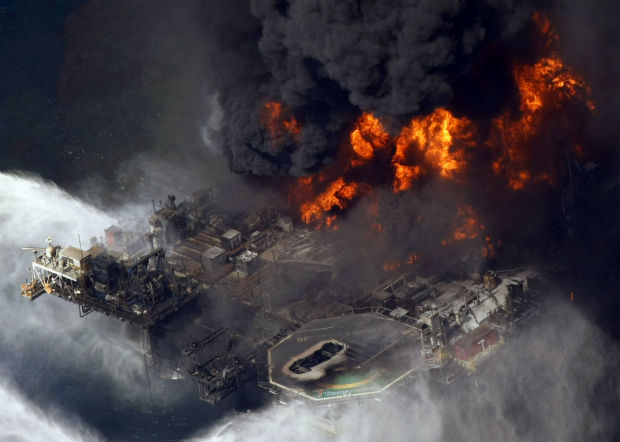BP spill left big oily ‘bathtub ring’ on seafloor

In this April 21, 2010 file aerial photo taken in the Gulf of Mexico more than 50 miles southeast of Venice on Louisiana’s tip, the Deepwater Horizon oil rig is seen burning. New research shows that the BP oil spill left an oily “bathub ring” on the seafloor that’s about the size of Rhode Island. AP
WASHINGTON — The BP oil spill left an oily “bathub ring” on the sea floor that’s about the size of Rhode Island, the smallest U.S state at 1,200 square miles (3,100 sq km), new research shows.
The study by David Valentine, the chief scientist on the federal damage assessment research ships, estimates that about 10 million (38 million liters) gallons of oil coagulated on the floor of the Gulf of Mexico around the damaged Deepwater Horizons oil rig.
Valentine, a geochemistry professor at the University of California Santa Barbara, said the spill from the Macondo well left other splotches containing even more oil. He said it is obvious where the oil is from, even though there were no chemical signature tests because over time the oil has degraded.
“There’s this sort of ring where you see around the Macondo well where the concentrations are elevated,” Valentine said. The study, published in Monday’s Proceedings of the National Academy of Sciences, calls it a “bathtub ring.”
Oil levels inside the ring were as much as 10,000 times higher than outside the ring, Valentine said. A chemical component of the oil was found on the sea floor, anywhere from two-thirds of a mile to a mile (1.6 km) below the surface.
Article continues after this advertisementThe rig blew on April 20, 2010, and spewed 172 million gallons (651 million liters) of oil into the Gulf through the summer. Scientists are still trying to figure where all the oil went and what effects it had.
Article continues after this advertisementBP questions the conclusions of the study. In an email, spokesman Jason Ryan said, “the authors failed to identify the source of the oil, leading them to grossly overstate the amount of residual Macondo oil on the sea floor and the geographic area in which it is found.”
It’s impossible at this point to do such chemical analysis, said Valentine and study co-author Christopher Reddy, a marine chemist at Woods Hole Oceanographic Institute, but all other evidence, including the depth of the oil, the way it laid out, the distance from the well, directly point to the BP rig.
Outside marine scientists, Ed Overton at Louisiana State University and Ian MacDonald at Florida State University, both praised the study and its conclusions.
The study does validate earlier research that long-lived deep water coral was coated and likely damaged by the spill, Reddy said. But Reddy and Valentine said there are still questions about other ecological issues that deep.